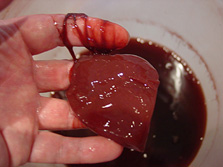sam111
Cook
I am wondering about how one can make homemade apple products
Mainly
I know I can juice apple to make apple juice + other ingrediants optional like sugar ,...etc
I am alittle confused about the difference between apple cider , apple juice, and hard apple cider , apple cider vinegar.
Currently from what I am reading is that apple cider is raw apple juice that has not undergone filtration to remove coarse particles of pulp or sediment, like apple juice has. ( analogy equivalent to orange juice with pulp and without )
Obviously hard apple cider is the alcohal version of apple cider/juice.
Question is hard apple cider created from just adding a packet of active yeast and leting it react for a few days to produce the alcohal + CO2 or is there more to it?
Last Question is apple cider vinegar (or in general any vinegar made from an alcohal product) Do you add just another yeast packet or have it sit longer...
I just don't get the fine line of when alcohal turns into vinegar or stays alcohal...
I mean I see alot of alcohal products last a long time but do they eventually all turn into vinegar ?
Basically I am trying to understand what/how one could create the different products homemade.
(leaving off the warning of the 4%-7% acid for vinegar to be human consumed... think of it as a cleaning agent )
)
Mainly
I know I can juice apple to make apple juice + other ingrediants optional like sugar ,...etc
I am alittle confused about the difference between apple cider , apple juice, and hard apple cider , apple cider vinegar.
Currently from what I am reading is that apple cider is raw apple juice that has not undergone filtration to remove coarse particles of pulp or sediment, like apple juice has. ( analogy equivalent to orange juice with pulp and without )
Obviously hard apple cider is the alcohal version of apple cider/juice.
Question is hard apple cider created from just adding a packet of active yeast and leting it react for a few days to produce the alcohal + CO2 or is there more to it?
Last Question is apple cider vinegar (or in general any vinegar made from an alcohal product) Do you add just another yeast packet or have it sit longer...
I just don't get the fine line of when alcohal turns into vinegar or stays alcohal...
I mean I see alot of alcohal products last a long time but do they eventually all turn into vinegar ?
Basically I am trying to understand what/how one could create the different products homemade.
(leaving off the warning of the 4%-7% acid for vinegar to be human consumed... think of it as a cleaning agent
Last edited:

